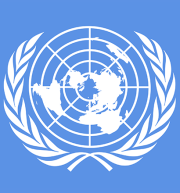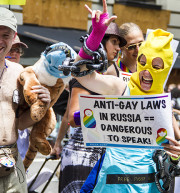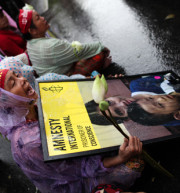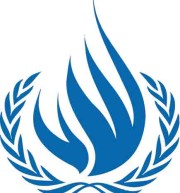
GENEVA – United Nations Special Rapporteur Maina Kiai will appear before the 26th Session of the UN Human Rights Council on June 10 to present his latest reports – one on his official mission to Rwanda and another focusing on the assembly and association rights of marginalized groups. He will also present a third report on observations on communications transmitted to Governments and replies received between March 1, 2013, and February 28, 2014. Kiai, who is the UN Special Rapporteur on the rights to freedom of peaceful assembly and of association, is scheduled to present at the Council’s afternoon session on June 10, which begins at 12:30 p.m. local time; his presentation may run into June 11, depending on the length of other agenda items. The session will be broadcast live on http://webtv.un.org/. Thematic Report: Groups Most At Risk Kiai’s thematic report documents the challenges faced by marginalized groups in exercising – or seeking to exercise – their rights to freedoms of peaceful assembly and of association. These groups, deemed “most at risk,” include persons with disabilities; youth; women; lesbian, gay, bisexual, transgender and intersex (LGBTI) people; members of minority groups; indigenous peoples; internally displaced persons; and non-nationals, including refugees,... Continue reading →

The United Nations has publicly released Special Rapporteur Maina Kiai’s third thematic report to the Human Rights Council, in advance of Kiai’s presentation of the report to the Council in June. The report focuses on the challenges facing those most “at risk” when exercising their rights to freedom of peaceful of assembly and of association. This category includes individuals and groups that are often relegated to the margins of society, both in their daily lives and in the exercise of their rights. Some of the groups considered in the report include persons with disabilities; youth, including children; women; lesbian, gay, bisexual, transgender and intersex (LGBTI) people; members of minority groups; indigenous peoples; internally displaced persons; and non-nationals, including refugees, asylum seekers and migrant workers. “Two thousand fourteen is shaping up to be the year of the protest, with the news dominated by stories of mass demonstrations in Ukraine, Venezuela and elsewhere,” said Kiai, who recently began his second three-year term as Special Rapporteur on the rights to freedom of peaceful assembly and of association. “But the crackdown on assembly and association rights extends far beyond what we see in the headlines.” “Those at the margins of society face vicious... Continue reading →

Backlash from the Arab Spring of early 2011 continues to be felt globally, with space for civil society actors increasingly shrinking. In recent years many States have responded to people’s assertions of peaceful dissent by violently clamping down on peaceful protests and other forms of assembly, unduly restricting the ability of associations to form and operate, and physically assaulting civil society actors. While those actions have negatively affected all who exercise their rights to peacefully assemble and freely associate, certain groups are at particular risk of having their space all but vanish. In this report, UN Special Rapporteur Maina Kiai focuses on the challenges facing groups that are often relegated to the margins of society, both in their daily lives and in the exercise of their rights to freedom of peaceful assembly and of association. He hopes to cast the spotlight on the ways in which the denial of the rights to freedom of peaceful assembly and of association leads to the marginalization of those groups and how marginalization exacerbates their inability to effectively exercise their rights. Some of the groups that are considered in the present report to be most at risk are persons with disabilities; youth, including children; women; lesbian, gay, bisexual, transgender and intersex... Continue reading →

UN Special Rapporteur Maina Kiai convened an expert consultation in Geneva on December 9 to help shape the parameters of his next thematic report, which will be presented to the Human Rights Council in June 2014. The thematic report will focus on how laws and practices may discriminate against and exclude certain groups when exercising or seeking to exercise their rights to freedom of peaceful assembly and of association. The Geneva consultation was organized to focus on problems faced by specific groups that the Special Rapporteur and his team had identified as frequently at risk, including youth, women, LGBT individuals, indigenous peoples, minorities, refugees, migrants and other non-nationals/stateless persons, and persons with disabilities. This is, of course, a non-exhaustive list. As one of the participants in our consultation pointed out, all of us can face heightened risks in certain circumstances (as Kiai’s latest thematic report on elections makes clear). As the consultation participants shared their stories and expertise, however, it became clear that most groups face similar types of threats – at least broadly speaking – despite coming from different countries and advocating for different issues. These threats can be categorized, and given the large and diverse number of groups... Continue reading →

Six women working on women’s issues in Pakistan are killed in an ambush. A workshop for LGBT human rights defenders is disrupted by authorities in Uganda. Indigenous leaders in the Philippines are subject to a wave of harassment, threats and killings. Thirteen women in Cambodia are imprisoned for defending their community against corporate land-grabbing. And four migrant bus drivers in Singapore are charged with inciting an illegal strike. Exercising the rights to freedom of peaceful assembly and association can be dangerous for anyone, anywhere in the world. But sometimes – and in some places – the danger is elevated for certain groups. Maina Kiai’s next report as Special Rapporteur is expected to focus on exactly this subject: groups most at risk of attacks and reprisals when exercising their assembly and association rights. Kiai and his team are currently in the process of researching the report. As we begin work on the report, we would like to hear your views. Thus far, we have identified several groups as high-risk: women, youth, LGBT individuals, indigenous peoples, members of minority groups, persons with disabilities, migrants, and activists working for economic and social rights. Among these groups, which ones are most at risk in your country and for what reasons? What are... Continue reading →

The Human Rights Council during conducted an interactive dialogue with the Working Group on the issue of human rights and transnational corporations and other business enterprises and with the Special Rapporteur on the rights to freedom of peaceful assembly and of association. Pavel Sulyandziga, Chair of the Working Group on the issue of human rights and transnational corporations and other business enterprises, said the Guiding Principles on Business and Human Rights provided a roadmap for both States and companies to take concrete steps to prevent and address adverse impacts on human rights. The Working Group had carried out a survey of both States and companies to build a solid baseline of data on efforts to implement the Guiding Principles. The survey provided important findings on where companies were facing challenges in implementation. Maina Kiai, Special Rapporteur on the rights to freedom of peaceful assembly and of association, said his second thematic report focused on two important issues: the ability of associations to access financial resources, and the ability to hold peaceful assemblies. Access to financial resources was of contemporary significance for many civil society organizations that bore the brunt of severe constraints in many cases, to the point of threatening their very... Continue reading →

Restrictions on funding have become a major existential threat to associations across the world, as governments increasingly use the financial noose as a way to silence peaceful dissent. Under international law, freedom of association encompasses not only the right to form and join an associations but also to seek, receive and use resources – human, material and financial – from domestic, foreign, and international sources. Sadly, the number of barriers to seeking such resources are increasing. This April 2013 report from UN Special Rapporteur Maina Kiai documents many examples: In Ethiopia, for instance, a law introduced in 2009 prohibits human rights associations from receiving more than 10 per cent of their overall resources from foreign sources. In Russia, a July 2012 law requires foreign-funded organizations engaging in “political activities” as so-called "foreign agents." States are obliged to facilitate, not restrict, access to funding so that associations can effectively take part in democratic and developmental processes, just like businesses and governments. This report also addresses obstacles to peaceful assembly and provides an overview of the Special Rapporteur's activities between May 1, 2012, and February 28, 2013. The report's document number is A/HRC/23/39. Update May 2014: In... Continue reading →

On September 27, 2012, the UN Human Rights Council adopted an important resolution that will help bring protections for the freedoms of peaceful assembly and of association into the 21st century. The resolution on “the rights to freedom of peaceful assembly and of association” (A/HRC/RES/21/16) reiterates "the important role of new information and communications technologies in enabling and facilitating the enjoyment of the rights to freedom of peaceful assembly and of association." It also stresses the importance of States promoting and facilitating access to the Internet. The resolution also "reminds States of their obligation to respect and fully protect the rights of all individuals to assemble peacefully and associate freely, online as well as offline." It goes on to stress the importance of safeguarding these rights in the context of elections, and for groups most at risk. "It is critical that the online environment be recognized as an important arena for people to exercising their assembly and association rights," said Maina Kiai, UN Special Rapporteur on the rights to peaceful assembly and of association. "The Internet, for example, is not just a means for people to assembly and associate in the real world - it is a place of assembly and association itself." In his 2012 report to the... Continue reading →

United Nations Special Rapporteur Maina Kiai called on all governments and the international community to further promote and protect the rights to freedom of peaceful assembly and of association, “violated or at risk in a number of countries.” “It is astonishing how often States have encroached upon the right of individuals to assemble peacefully by also violating their rights to life and to be free from torture, rights which allow no limitation,” Mr. Kiai said during the presentation of his annual report to the UN Human Rights Council, in which he makes a number of recommendations to establish minimum standards to protect the rights to freedom of peaceful assembly and of association. “I understand that the rights to freedom of peaceful assembly and of association may be welcomed with reserve by those States that fear dissent,” but he stressed that such rights are essential components of democracy. “States should protect the rights of all individuals, including persons espousing minority or dissenting views or beliefs, human rights defenders, trade unionists or even migrants, to assemble peacefully and associate freely.” “Freedom to peacefully assemble and associate is to be considered the rule and limitations the exception,” the independent human rights expert underscored.... Continue reading →

The right of peaceful assembly covers not only the right to hold and to participate in a peaceful assemblies but also the right to be protected from undue interference. It further protects those monitoring peaceful assemblies. The right to freedom of association ranges from the creation to the termination of an association, and includes the rights to form and to join an association, to operate freely and to be protected from undue interference, to access funding and resources and to take part in the conduct of public affairs. In this report, Special Rapporteur Maina Kiai highlights best practices worldwide that promote and protect the rights to freedom of peaceful assembly and of association, covering areas such as: • The definition of "peaceful assembly" and "association" • The presumption in favor of allowing peaceful assemblies • Notification vs. authorization of peaceful assemblies • The right to be protected from undue interference during assemblies • Building capacity of law enforcement • The rights of monitors and journalists in the context of peaceful assemblies • The right to form and join an association, including unregistered associations • The right to operate an association freely and be protected from undue interference • The right for associations to... Continue reading →